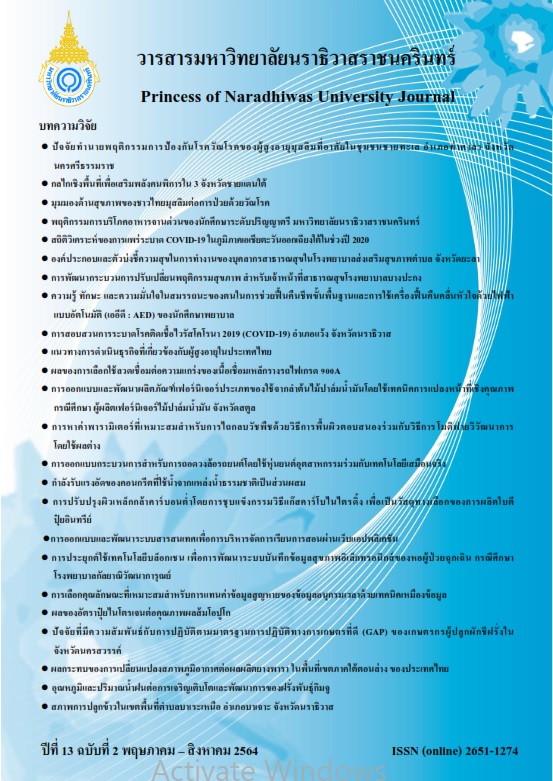Guidelines for Operating Businesses for Elderly in Thailand
Keywords:
Structural Equation Model, Operating Businesses, The ElderlyAbstract
According to the continuous increase number of elderly population, Thailand is stepping into aged society, resulting in business sector to adjust itself to meet the changes of the target customers, most of whom are the elderly. This research aimed 1) to study the operational characteristics of businesses for elderly in Thailand, 2) to study the latent variables of the guidelines for operating businesses for elderly in Thailand and 3) to develop the structural equation model of the guidelines for operating businesses for elderly in Thailand. For the qualitative part, the in-depth interview technique was used to collect data from 9 experts, and the focus group was applied to gather information from 7 advisors. For the quantitative part, questionnaires were used to collect data from 500 entrepreneurs engaged in businesses related to the elderly which the samples were selected by multi-stage sampling. The descriptive, inference, and multivariate statistics were used to analyze the data.
The study revealed that the characteristics for operating businesses for the elderly in Thailand, were the top 3 highest percentage score which were 1) organizations still have not been members of any associations of the elderly of Thailand at 95.8 percent 2) medical and health products were needed by the late elderly (80 years and over) at 51.8 percent 3) organizations created innovations for elderly cooperating with private organization at 50.6 percent.
The highest mean score in the aspects of the guidelines for operating businesses for the elderly in Thailand were as follows: Innovation & Technology; purchasing some parts of or whole technology from outside to be further applied, Internal process; improving organizations to be more flexible in order to be ready for supporting changes, Marketing; products should be easy to use and services should be easy to access, convenient, and not complicated, Resources; supporting the elderly to co-invest in businesses and Learning & Development; career path should clearly be specified.
The analysis of the developed structural equation model showed that it passed the assessment criteria and was consistent with the empirical data. Its values of Chi-square Probability Level (CMIN-p), Relative Chi-square (CMIN/DF), Goodness of Fit Index (GFI), and Root Mean Square Error of Approximation (RMSEA) were 0.087, 1.109, 0.951 and 0.015, respectively.
References
Caic, M., Odekerken-Schröder, G., & Mahr, D. (2018). Service robots: value co-creation and co-destruction in elderly care networks. Journal of Service Management, 29(2), 178-205.
Department of Business Development Ministry of Commerce. (2019). The Statistic of the Juristic Person's Registration in 2019. Retrieved February 16, 2020. from: www.dbd.go.th.
Eisend, M., Evanschitzky, H., & Calantone, R. J. (2016). The relative advantage of marketing over technological capabilities in influencing new product performance: the moderating role of country institutions. Journal of International Marketing, 24(1), 41-56.
Glende, S., Conrad, I., Krezdorn, L., Klemcke, S., & Krtzel, C. (2016). Increasing the acceptance of assistive robots for older people through marketing strategies based on stakeholder needs. International Journal of Social Robotics, 8(3), 355-369.
Hidayat, R., & Budiatma, J. (2018). Education and job training on employee performance. International Journal of Social Sciences and Humanities, 2(1), 171-181.
Jensen, J. A., Cobbs, J. B., & Turner, B. A. (2016). Evaluating sponsorship through the lens of the resource-based view: The potential for sustained competitive advantage. Business Horizons, 59(2), 163-173.
Kale, D. (2017). Sources of innovation and technology capability development in the Indian automobile industry. Institutions and Economies, 121-150.
Karlinsky-Shichor, Y., & Zviran, M. (2016). Factors influencing perceived benefits and user satisfaction in knowledge management systems. Information Systems Management, 33(1), 55-73.
Koohang, A., Paliszkiewicz, J., & Goluchowski, J. (2017). The impact of leadership on trust, knowledge management, and organizational performance. Industrial Management & Data Systems, 117(3), 521-537.
Kotteritzsch, A., & Weyers, B. (2016). Assistive technologies for older adults in urban areas: a literature review. Cognitive Computation, 8(2), 299-317.
Li, S. (2017). Duality or Specialization: The Innovation Performance and the Interaction between Science-Based Innovation and Technology-Based Innovation. Open Journal of Business and Management, 5(04), 561
Lies, J. (2019). Marketing Intelligence and Big Data: Digital Marketing Techniques on their Way to Becoming Social Engineering Techniques in Marketing. International Journal of Interactive Multimedia & Artificial Intelligence, 5(5).
Matthew-Maich, N., Harris, L., Ploeg, J., Markle-Reid, M., Valaitis, R., Ibrahim, S., ... & Isaacs, S. (2016). Designing, implementing, and evaluating mobile health technologies for managing chronic conditions in older adults: a scoping review. JMIR mHealth and uHealth, 4(2), e29
McIvor, R. (2016). An analysis of the application of process improvement techniques in business process outsourcing. International Journal of Quality & Reliability Management, 33(3), 321-343.
Najafi-Tavani, S., et al. (2018). How collaborative innovation networks affect new product performance: Product innovation capability, process innovation capability, and absorptive capacity. Industrial Marketing Management,73, 193-205.
Nason, R. S., & Wiklund, J. (2018). An assessment of resource-based theorizing on firm growth and suggestions for the future. Journal of Management, 44(1), 32-60.
National Statistical Office Thailand (2018). The Report on the 2018 survey of older person in Thailand, Statistical Forecasting Division National Statistical Office. (in Thai)
Prompak, C. (2013). Aging Society in Thailand. Bureau of Parliamentary Studies of the Secretariat of the Senate. (in Thai)
Silpcharu, T. (2020). Research and statistical analysis with SPSS and AMOS. (18th ed.) Bangkok: Business R&D Ordinary Partnership. (in Thai)
Srisuk, A. (2018). Lived experiences of sons being caregivers for dependent elderly parents. Master of Nursing Science Field of Study of Nursing Science Thesis, Chulalongkorn University. (in Thai)
Thailand Development Research Institute. (2017). The estimated increasing cost of the elderly compared with government revenue 2012 - 2021. Retrieved October 10, 2019. from: http://www.nso.go.th/sites.
Yang, M., Huang, H., Yuan, H., & Sun, Q. (2016, July). Interaction design of products for the elderly in smart home under the mode of medical care and pension. In International Conference on Human Aspects of IT for the Aged Population (pp. 145-156). Springer, Cham.




